
May 14, 2014: Senate Finance Committee Chairman Sen. Ron Wyden, D-Ore., speaks with reporters on Capitol Hill in Washington. (AP)
Nothing brings the parties together in an election year like a giant grab-bag of tax breaks worth billions.
The Senate this week took a breather from recent gridlock to overwhelmingly advance a bipartisan bill that would renew more than $80 billion in expired tax credits through the end of next year, likely teeing up a vote on final passage next week. Indeed, the opening vote left only a trio of deficit hawks crying foul, with 96 of their colleagues opting to start debate on the measure.
Dubbed the EXPIRE Act, the legislation contains a multitude of obscure tax breaks, covering everything from filmmakers and racehorses to rum producers in Puerto Rico. It would also renew more widely used credits, including for corporate research and development.
Senate Finance Committee Chairman Ron Wyden is shepherding the package through the upper chamber, despite warning this would be the last time Congress moves to temporarily renew all the credits on his watch. The Oregon Democrat, who still holds out hope of a comprehensive tax overhaul, would prefer to make some of the tax credits permanent to give certainty to businesses while discarding those deemed less critical.
"The Finance Committee gave the EXPIRE Act its name for a good reason, and that's because it's going to end after two years," Wyden said in a floor speech. "I've heard my colleagues on the other side of the aisle over the last few days, and when it comes to the need for comprehensive tax reform, they have me at 'hello.'"
The fact the tax breaks are not paid for by cutting spending or raising taxes elsewhere doesn't sit well with everyone. Sens. Tom Coburn of Oklahoma, Mike Lee of Utah and Jeff Flake of Arizona voted to block the bill, which would add an estimated $84 billion to the deficit over the next decade, and they are joined in their opposition by a number of conservative groups.
"The Senate's tax extenders -- and indeed the entire process surrounding the extension of expiring tax provisions -- is one of the most egregious examples of Washington using its powers to prop up well connected interests," Heritage Action declares on its website, urging a "no" vote.
In the House, where Ways and Means Chairman Dave Camp has likewise called for comprehensive reform of the nation's tax code, leaders have taken a different approach and chosen to permanently extend a handful of the tax breaks. The GOP-controlled chamber last week voted to make the R&D tax credit permanent, a move that would add some $156 billion to the deficit over the next 10 years.
Notably, many House Democrats used that vote as an opportunity to stake out the fiscal high ground, accusing the GOP of being reckless in adding to the deficit. The White House even threatened to veto that bill since it isn't offset by another means of raising revenue.
The administration has stopped short of threatening to veto the Senate bill, but said it looks forward to "working with Congress to offset its cost by closing tax loopholes."
Not surprisingly given recent history, Senate Majority Leader Harry Reid has not expressed a willingness to allow amendments. But while GOP senators are not blocking the legislation over that fact, they've continued to press the Nevada Democrat for an opportunity to vote on an amendment that would eliminate the Affordable Care Act's tax on medical devices.
There's a fat chance of that happening, if Reid's comments to reporters this week are any indication.
"I'm not going to cry any big tears over the device folks," he said. "They're doing extremely well with ObamaCare. Their profits have gone up significantly since ObamaCare."
Capitol Attitude is a weekly column written by members of the Fox News Capitol Hill team. Their articles take you inside the halls of Congress, and cover the spectrum of policy issues being introduced, debated and voted on there.




